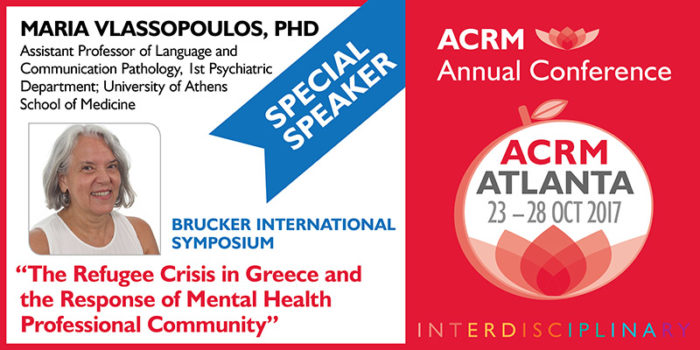Maria Vlassopoulos, PhD, is Assistant Professor in Language and Communication Pathology, 1st Psychiatric Department of the National and Kapodistrian University of Athens Medical School, Greece.
Congratulations for winning this award and we are looking forward to your presentation. Tell us about your involvement in the field of Rehabilitation?
I have worked in the field of rehabilitation for over thirty years in Greece. When I began work here I was an inexperienced clinician trained in the UK and the USA with utopian ideas and no contact with the realities I was about to encounter. Over the years I have seen Greece transformed from a country where rehabilitation was a budding concept to one which is trying despite severe financial drawbacks to offer families a wide range of services for their rehabilitation needs. During these years my involvement in this process has been both direct, as a clinician and therapist in various clinical and therapeutic settings, and indirect, as a coordinator and teacher of students and professionals as well as through my involvement in various governmental policy-making committees. This dual role has often enabled me to be pragmatic in my expectations, but also to have an overall perspective of the needs involved.
Who has been one of the most influential people in your career and why?
Countless people have influenced me in my career! My first influence when I started volunteering in this field at the age of 18 was a courageous psychologist who taught me the importance of compassion, followed by my teachers who taught me how to question and analyse; my first employer who asked me ‘what exactly do you do?’ and taught me the importance of professional identity; the members of the interdisciplinary team where I have worked for these 30 years who have taught me that each person in a rehabilitation team has a precious contribution to make, that democracy and equality can be found in any form and setting, that even though perspectives may differ, the whole is more important than the parts. Finally and most importantly my greatest influence has been the families I have served over the years, who have taught me humility.
What are you looking forward to in your near future?
Naturally I am looking forward to attending the ACRM 94th Annual Conference in Atlanta, Georgia. I feel greatly honoured by the award bestowed on me and am delighted that I will be coming to the USA to receive it! I am very happy that I will have the chance to raise awareness of the refugee situation which we are experiencing in Greece and many other European countries. I am looking forward to sharing my thoughts and gaining new insights from my international colleagues, after all communication between all of those involved in rehabilitation, sharing new experiences and innovations, is the key to opening the doors in this sensitive and challenging area, which affects us all on many levels.
Tell us about your work.
Apart from my teaching and research work, I am directly involved with the early intervention of neuro-developmental disorders. We founded the first Early Intervention Programme at the Child and Adolescent Unit of the University of Athens 1st Psychiatric Clinic 33 years ago, which despite all difficulties, has continued to serve the families of young children with these disorders in four Athenian boroughs. The programme is interdisciplinary and eclectic, with a range of interventions, both, direct and indirect group and one-to-one. It is supplemented by a training programme for young professionals, which runs on a yearly basis. This programme is the chief clinical area in which I am involved, although I am also occupied by other professional issues on a voluntary basis, such as the European Committee for Speech and Language Therapists (CPLOL), where I was Vice-President responsible for matters concerned with the education and training of SLTs throughout Europe.
What are some challenges you have encountered in your field?
The principal challenges involve our perceptions of ourselves and our professional status, involvement and cooperation, equal opportunities, social justice as well as battling with assumptions and preconceptions. As a clinical communication specialist I am constantly striving to better understand the needs of the people we serve and to try and meet those needs in a realistic and compassionate way. I have had to face my shortcomings as well, and have tried to modify them and to adjust my standards, but not to lower them. My conclusion is that we are all linked in the rehabilitation process in ways which are not often discernible, but that if we manage to make these links more transparent, then we will be doing a better job.
What do you enjoy doing in your free time?
This part of the interview has been heavily edited by my daughter who thankfully keeps me in check! She objected to any mention of birdsong (“too corny”), knitting (“too old fashioned”) and even disapproved of what I thought were rather optimistic thoughts on mortality (“seriously?”). So in this expurgated version I am allowed to mention my preoccupation with my garden which gives me the peace to revisit the day’s experiences in a safe haven; the glass of wine at sunset; the closeness and joy of my friends’ and family’s company. And I can put in a mention to literature, art and music which enrich life on this planet.











